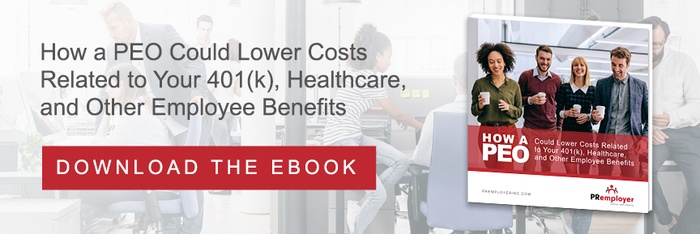 Minimum wage increase discussions have regularly made their way into the news recently. While the discussion has gained some traction, nothing has come of it yet, since an increase in wages has specific implications for employees and their employers beyond an immediate bump in spending power.
Minimum wage increase discussions have regularly made their way into the news recently. While the discussion has gained some traction, nothing has come of it yet, since an increase in wages has specific implications for employees and their employers beyond an immediate bump in spending power.
Increased wages may also affect business viability, ultimately causing consumers to pay more for the same goods and services to offset higher wage costs. It's a complex topic since the benefits of increased spending power could offset other costs. There's no obvious right or wrong path, so it's helpful to be prepared for either option. Understanding the implications of increased wages, whether due to regulations or market conditions, will let you prepare your business for the changing circumstances.
Hiring May Slow Down
The most immediate, albeit temporary, reaction to a mandatory wage increase is that hiring slows down. It will take some time before the overall impact of a wage increase becomes noticeable, and erring on the side of caution, businesses will likely pause all hiring efforts.
Pausing hiring will give companies time to estimate or evaluate the impact of increased wages on their company. It also provides the business with time to grow revenue and increase cash reserves before hiring again. That way, they can resume their recruiting efforts if increased wages boost revenue because customers have more spending power, or they can pursue other hiring methods, like contracting through staffing companies.
Companies have other options to offset costs, as well. Benefits cost companies a lot of money, but HR outsourcing can cut costs, especially in uncertain times. The current economic climate makes for anxious employees and employers, and a Professional Employer Organization (PEO) helps to reduce that anxiety. It's one of the measures you can take to cut costs, and it won't sacrifice the quality of your benefits. Saving money will help you navigate tough times and can keep your company stable.
Prices Of Goods May Increase
Businesses may offset internal costs by increasing their prices, letting their customers shoulder some of the burdens of higher wages. With higher pay, consumers will have more spending power. They'll have more capacity to pay more for the goods and services offered by different companies.
These increased costs go down the line, creating a snowball effect that possibly leads to general inflation. From the consumer to the supply level, prices may increase. Increased prices can negatively impact business because consumers buy less or stop buying a product altogether when it becomes too expensive. It could cause companies to reduce their output, reducing the need for additional or even present staff. However, the exact effect is unknown and won't be known until long after implementing changes.
Wage Competitiveness Decreases
A minimum wage increase levels the playing field by lowering wage competitiveness. A business offering wages that are $5 higher than the minimum wage is no longer competitive if the minimum wage increases by close to or above the same amount. Because of the reduction in the company's ability to pay a competitive wage, they must seek out other opportunities to distinguish themselves from their competitors.
If a business can't compete as well on pay, they will still be able to compete with benefits. A PEO can help your business save money while offering improved health insurance benefits. Those benefits can keep your existing employees happy and attract new employees. It's no small task in good times, let alone uncertain times, and good health benefits are particularly crucial coming out of a global pandemic.
The right PEO can evaluate your current benefits package and help your company save money by making strategic adjustments. They'll help you lower costs in certain areas and let you distribute spending to increase employee retention in others, overall improving your efficiency. That will bring you a good return on your PEO investment.
Employee Engagement Increases
When wages increase, employee engagement increases since giving workers more money can help them feel empowered in their jobs. More money brings people more peace of mind, and giving employees a raise, even if a minimum wage increase forces your hand, will naturally make employees feel more engaged with their work.
Employees who receive higher wages can afford more, which often means the costs of life's necessities. For too long, wages have been stagnant, and increasing them can relieve employee stress and anxiety.
By seeing an increase in wages, your employees may no longer need to work multiple jobs to make ends meet. They can put more time and focus into the work they do for you, making them more efficient and productive employees. They no longer feel bogged down by the never-ending work at multiple jobs and have a better quality of life, getting to spend more time with family and friends.
This increase in quality of life comes from the increased wages offered by your company. When employees feel cared for, as is the case when an employee gets a raise, they are more loyal to an organization, giving you higher retention and reducing the need to spend more on recruiting.
Higher Wages Can Be A Net Positive
In business, it's crucial to pay attention to the news. Legislators, both at the federal and state level, make decisions that directly affect your business and your employees. Employment trends, labor costs, and your company are all intertwined. Ignoring that fact only puts your business at risk.
You need to plan and prepare now for the possibility of mandatory wage increases. Being proactive puts you ahead of your competition and lets you make changes now that allow you to weather the inevitable storm ahead.
One of the best ways your company can prepare and begin to make changes is by partnering with a PEO. When you have trusted HR experts to guide you through the changes ahead, you can beat your competitors to the punch. You may be able to retain more employees through a downturn and keep your production and efficiency high.

